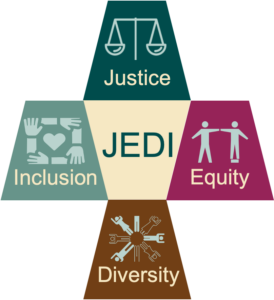
As a certified B Corporation, Magnolia Consulting commits to being a force for good through actions that create a kinder, more just, equitable, and inclusive society.
We recognize the power and potential of research and evaluation in
- giving a voice to and protecting the rights of the marginalized and disempowered,
- representing the lived experiences of diverse communities with respect and honor,
- improving equitable access to opportunities for diverse groups of people, and
- transforming systems to promote fairness and equity.
We recognize the existence and impact of systemic racism, socioeconomic disparities, and educational inequities that have disproportionately affected the most vulnerable communities. We know these must be dismantled if we want our educational institutions to represent just, equitable, diverse, and inclusive (JEDI) learning systems where all members are valued, heard, respected, and empowered to pursue their full potential. We seek to address these historic inequities in how we work with each other and those we serve.
As an organization, we believe that we enact the power and potential of our research and evaluation practices when all team members have a voice and are encouraged to contribute in a supportive work environment. We take collective responsibility in creating an environment where everyone feels included, respected, and comfortable in bringing their whole self to Magnolia. We embrace people of all backgrounds, cultures, and life experiences and seek to discover our “sameness,” while also respecting our unique differences. We honor diverse perspectives, hold space for truly hearing and understanding each other, and harness our collective strengths to bring into the world services that promote justice, equity, diversity, and inclusivity.
These JEDI principles interrelate and reinforce each other while providing a framework for mindful practices among Magnolia team members and with our clients, funders, and research and evaluation stakeholders.
Being inclusive of others—true and deep effort to understand and welcome folks with different lived experiences than ours—fosters diversity. Diversity, by bringing many people with different stories, backgrounds, skills, and needs into one place, requires equity to be sustainable. And equity, which strives to give people the specific resources they need to live up to their own individual or collective potential, aims to remove unfair barriers to opportunity and ultimately build a just society: one where everyone, regardless of who they are, is equally able to live a full and meaningful life.
—Taimur Ahmad, Access Fund
We interweave these JEDI principles into our core values to fulfill our mission and purpose as an organization through the following JEDI definitions and strategies. These strategies apply to organizational practice as well as research and evaluation practice.
Justice. Dismantling barriers to resources and opportunities in society so that all individuals and communities can live a full and dignified life.
—as defined by the J.E.D.I Collaborative
Organizational Strategies in Support of Justice:
- Cultivating a concern for others with recognition and compassion for the oneness of humanity and our interconnectedness
- Intentionally asking team members and clients how we can do better to respond to the needs of underrepresented, marginalized, and disempowered groups
- Reflecting on the history and current examples of racism, socioeconomic inequalities, discrimination, and harm to BIPOC and LGBTQIA communities in our industry of education and education research and evaluation
- Developing an understanding of the intersection between research and evaluation practices and discrimination, marginalization, and inequities
- Publicly recognizing and supporting our clients and partners who are actively engaged in efforts to promote justice
Research and Evaluation Strategies in Support of Justice:
- Integrating research and evaluation questions aimed at advancing social justice into study designs
- Seeking partnerships with organizations that advocate for social justice and welfare for underrepresented, marginalized, and disempowered populations
- Seeking funding for studies that give a voice to populations who have been oppressed, devalued, or marginalized and elevating understanding of their experiences and rights
- Putting study results in the hands of those positioned to take action for catalyzing positive change
Equity. Allocating resources to ensure everyone has access to the same opportunities. Equity recognizes that advantages and barriers—the “isms”—exist.
—as defined by the J.E.D.I Collaborative
Organizational Strategies in Support of Equity:
- Giving team members access to support and opportunities to address barriers and challenges that could affect their overall health and wellbeing
- Providing equitable pay to team members
- Establishing recruiting and hiring practices that include working with organizations and platforms that reach diverse populations
Research and Evaluation Strategies in Support of Equity
- Asking questions of our clients and in our studies about the systems and conditions that have maintained inequities among underrepresented, marginalized, and disempowered groups
- Examining outcomes for underrepresented, marginalized, and disempowered subgroups in our studies
- Ensuring we communicate findings in an accessible and understandable way for all stakeholders and advocating to clients the importance of supporting information accessibility
- Providing pro-bono services and charitable donations to organizations led by or serving BIPOC, LGBTQIA, and temporarily dislocated (homeless) communities
Diversity. All the differences between us based on which we experience advantages or encounter barriers to opportunities. Diversity isn’t just about racial differences.
—as defined by the J.E.D.I Collaborative
Organizational Strategies in Support of Diversity:
- Cultivating curiosity by asking questions and listening to learn something new
- Finding our common ground and shared humanity
- Recognizing our unconscious biases in how we perceive other races/ethnicities, cultures, gender identities, and socioeconomic classes that may be different from our own
- Acknowledging the subconscious assumptions we make about other people
- Being aware of how our beliefs affect the decisions we make and how we interpret and report data
- Continually reviewing our policies and practices for bias
- Intentionally prioritizing team diversity through hiring strategies that reach BIPOC candidates, establishing a BIPOC internship program, and diversifying our subcontractor and vendor pool
- Participating in professional learning opportunities that build our knowledge and skills to implement research and evaluation strategies that address diversity
Research and Evaluation Strategies in Support of Diversity:
- Using culturally responsive study designs that bring multiple voices, experiences, and outcomes to the forefront
- Taking a participatory or empowerment approach to evaluations involving underrepresented, marginalized, and disempowered populations to ensure all aspects of studies are culturally representative and appropriate
- Partnering with individuals and organizations who not only express a commitment to antiracism and antidiscrimination practices, but whose actions back up that commitment
- Advocating to clients and funders the importance of addressing diversity in our research and evaluation strategies
- Modeling our approach to diversity and all JEDI principles through our written and verbal communications with clients and funders, including capability statements, proposals, social media presence, blogs, and website
Inclusion. Fostering a sense of belonging by centering, valuing, and amplifying the voices, perspectives, and styles of those who encounter more barriers based on their identities and lived experiences.
—based on the definition by the J.E.D.I Collaborative
Organizational Strategies in Support of Inclusion:
- Cultivating a trusting and safe environment where everyone feels they belong and where all ideas are heard and taken seriously without minimization. We cultivate a safe and trusting environment by
- Understanding each other’s needs
- Assuming positive intentions
- Illuminating our collective goal and sharing responsibility in achieving that goal
- Listening to each other without judgment and affirming what we hear even when there are differences
- Listening to each other without judgment and affirming what we hear even when there are differences
- Finding and honoring our sameness to solidify the connection that creates community
- Serving as an organizational role model as a force for good in the evaluation and research industry and the world
- Cultivating an environment where everyone can thrive and feel valued as well as where they can value themselves and feel inspired
- Creating space for connection, celebration, input, ownership, leadership, mindfulness, and collaboration
- Seek out others who might offer different perspectives from our own
Research and Evaluation Strategies in Support of Inclusion:
- Making our study findings accessible to those who would use them to catalyze action for positive change
- Communicating to study participants that their voices matter, and everyone’s voice is respected and honored
- Represent study participants’ voice in reporting study findings through direct quotes, vignettes that capture participant experiences, and recommendations that focus on acknowledging and elevating participant and stakeholder voice
- Interacting with clients, partners, and study participants with kindness, openness, and respect so they feel welcome and justly treated
